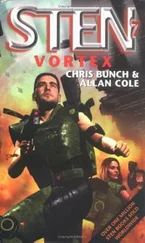Hell. He jumped to his feet, despair replacing fatigue. In minutes, he and his men would be dead or dying. And the damned South Africans would be racing past them to capture Windhoek.
Then Mares realized that the lieutenant was pointing north-not south.
North toward a long column of wheeled APCs and trucks towing antitank guns. A Cuban flag fluttered from the lead GAZ-69 jeep’s long, thin radio antenna.
His battalion’s sacrifice had not been in vain. The road to Namibia’s capital was closed.
AUGUST 24-WNDHOEK AIRPORT, NAMIBIA
Huge, multiengined jet transports orbited slowly low over Windhoek’s single airstrip, waiting for their turn to land on an already crowded runway. Those already on the ground taxied toward waiting work crews and fuel trucks.
Of all the hundreds of men at the airport, only four wore civilian clothing.
Several Cuban soldiers and two officers escorted the French freelance reporter and his camera crew-shepherding them through apparent chaos while they looked for just the right spot to shoot the promised interview.
Time and again they stopped, only to walk on when the sound man shook his head-driven on by a maddening combination of wind and roaring jet engines that made recording human voices impossible.
At last, they found a sheltered spot with a fine view of the flight line.
The Frenchman stepped out in front of the camera. He was a tall, rangy man, and years of outdoor assignments in world trouble spots and war zones had given him a wind burned and disheveled look that makeup could not conceal. One of the two Cuban officers followed him and stood at his side.
“Very well. Let’s try to do this in a single take, okay?”
His crew and the Cubans nodded, all hoping to get in out of the wind and noise. The cameraman lifted his Minicam onto his shoulder and punched a switch.
“Recording.”
“This is Windhoek Airport. Normally a small field serving the rustic capital of the world’s newest nation, it is now the center of a fierce military struggle. With South African military units about fifty kilometers away from the city, Cuban and Angolan reinforcements are being airlifted in at a breakneck pace. While the exact numbers are a closely guarded secret, each of the big 11 -76 transports you see landing behind me can carry more than one hundred fifty troops or two
armored fighting vehicles.” The reporter paused, waiting as a jet screamed past on final approach.
“And planes have been landing like this for the past two days.
“With me is Colonel Xavier Farrales of the Cuban Army.” The colonel was a short, dark-skinned man in dress uniform. Although the winter season moderated the heat somewhat, the colonel was clearly uncomfortable. He had his orders, though, and knew exactly what he had to say. He smiled warmly and nodded at the camera.
The Frenchman turned toward him, mike in hand.
“Colonel, Western intelligence sources have claimed that these big Ilyushin transports aren’t part of Cuba’s regular Air Force. And there’ve been other, as yet unconfirmed, reports of advanced surface-to-air missiles and other hardware being used here that aren’t normally in your country’s inventory. Certainly all this must be a tremendous financial drain on your country. How much financial and logistic support has the Soviet
Union promised to provide? And does Moscow plan to commit its own ground troops?”
The colonel’s English was accented but clear. He had been carefully chosen for this task. Smiling, he said, “Certainly Cuba is a small country. We have little to spend but our soldiers’ blood, and much of this would be impossible without fraternal assistance. We are receiving help from many of our socialist allies. Naturally, I cannot speak for the depth of any one country’s support. Any participation in this struggle for freedom is honorable, no matter how large or how small.”
The Cuban officer’s smile grew slightly less sincere.
“We would even welcome assistance from the West’s socalled democracies. South Africa’s aggression is a matter that should cross all ideological boundaries.”
The reporter hid a grimace. Political doublespeak made poor television.
He persisted.
“But what are your country’s long-range intentions in
Namibia? What do you hope to gain from your involvement in this war?”
Farrales puffed up his beribboned chest.
“Cuba’s My goal is to drive the
South Africans from Namibia and to secure its sovereignty for the future.
All our efforts, both diplomatic and military, are designed to achieve this result. That is why our forces are converging here, at Windhoek, to repel the completely unjustified attack made by Pretoria’s racist forces. Cuba is only fulfilling her internationalist duty.”
The Frenchman nodded. He could recognize a closing statement when he heard one. Fine. They wouldn’t get much useful play out of the colonel’s pompous rhetoric, but at least they’d be able to sell some good, dramatic pictures of Cuba’s massive airlift. He stepped back and made a cutting motion across his throat, signaling his cameraman to stop shooting.
“Thank you, Colonel.
You’ve been most helpful.”
Farrales took the Frenchman’s offered hand, shook it, and walked away-glad to have escaped so easily. Western journalists were usually irritatingly cynical and uncooperative. In any event, the reporter and his crew would be on an airplane bound for Luanda inside the hour. From there, their story would be edited and transmitted around the world-pouring visual evidence of
Cuba’s power and resolve into the homes of tens of millions.
Gen. Antonio Vega’s temporary headquarters occupied one wing of the small airport terminal, and Farrales made haste to report. After being passed through by the general’s aide and radio operator, the colonel knocked twice on a wooden door and entered without waiting.
Vega sat at a camp desk, surrounded by maps, books, and pieces of paper.
His uniform coat hung from a hook with his tie draped over it. Wearing a rarely seen pair of glasses, he worked steadily, punching in numbers on a
German-manufactured pocket calculator.
Farrales saluted.
“Report, Colonel.” Vega’s tone was impatient, and he did not look up from his work.
“Were you successful?”
“Yes, Comrade General. I included the information we wanted to make known and rubbed their noses in the West’s cowardice as well.”
Vega glanced at him, smiling now.
“Good. Very good.” He turned back to his work, still speaking.
“Since this interview went so well, Colonel Farrales, see how many others
you can set up. As long as the Western media is singing our song, let’s help them sing it. It’s nice to have them on our side for a change.”
Vega finished his calculations and made a series of rapid notations on one of the maps. Then he stood up, stretched, and started to clear the camp desk.
“Now, get my aide in here. I want to be on the next plane to
Karibib. “
Forty minutes later, the Frenchman and his film crew boarded an Angolan
TAAG airlines An-26, a Russian-built transport aircraft that was also used as a civil airliner. No amount of bright paint could hide its military origins. The rear loading ramp was 4 dead giveaway, as were the seats that folded up against the cabin sides.
As the An-26 took off and climbed high above the barren Namibian landscape, its pilot turned a little farther to the east than normal.
This ensured that the plane passed well out of sight of the small town of Karibib-140 kilometers northwest of Windhoek, as the transport flies.
It was 180 kilometers by what passed for a road.
Gen. Antonio Vega’s plane, a Cuban Air Force An-26 in a drab sand-and-green paint scheme, followed ten minutes behind-closely escorted by two MiG-29s. But instead of continuing north toward Luanda, the large twin turboprop slid west-on course for Karibib.
Читать дальше












